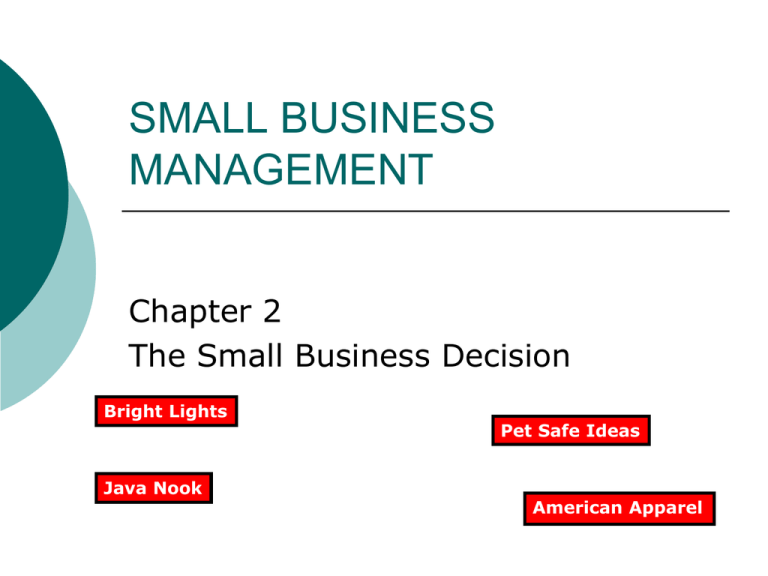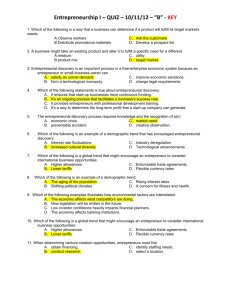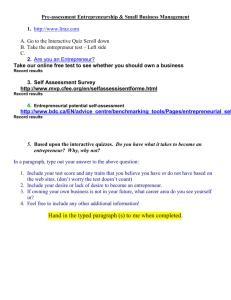SMALL BUSINESS MANAGEMENT
advertisement

SMALL BUSINESS MANAGEMENT Chapter 2 The Small Business Decision Bright Lights Java Nook Pet Safe Ideas American Apparel CHAPTER OBJECTIVES 1. To discuss the advantages and disadvantages of small business ownership as a starting point in making the small business decision. 2. To review the personal and organizational attributes of a successful small business owner. 3. To explain the reasons some businesses succeed and others fail. 4. To discuss entrepreneurial development in large business. 5. To identify the differences between an entrepreneur and a manager. The Small Business Decision Personal Evaluation Self evaluation exercise Pg 43 Advantages of Small Business Ownership More personal contacts with people Independence Customers, suppliers, employees etc But must answer to ……….. Skill Development Potential Financial Rewards Challenge Enjoyment Rewards of Entrepreneurship Disadvantages of Small Business Ownership Risk Stress Need for Many Abilities Limited Financial Rewards People Conflicts Time Demands Java nook Entrepreneur Defined A person who starts and/or operates a business. All active owner-managers and second generation members of family owned firms and owner-managers which buy out founders of existing firms. Also includes salaried managers of larger corporations who have a flair for innovation and risk. Demographic Characteristics of Entrepreneurs Parents owned business – Foreign parents – High school degree or less – College or more – Age 31 and under – Age 40 or more – Personality Characteristics Required by Successful Entrepreneurs Achievement Orientation Risk Taking Independence, Self Confidence, Self Assurance Innovativeness Strong Verbal and Numerical Skills Selling Skills Personality Characteristics Required by Successful Entrepreneurs (cont) Problem Solving Abilities Strategic Planning Perseverance American Apparel The Small Business Decision Organizational Evaluation Small Business Successes Small Business Failures Small Business Successes Alertness to Change – Ability to Attract and Hold Competent Employees – Staying Close to the Consumer -- Small Business Successes Thoroughness with Operating Details Ability to Obtain Needed Capital Effective Handling of Laws, Rules, and Regulations Small Business Failures Bankruptcies – Business just closing doors 11,000/year Many more Why the failure Life cycles 55% operate after 3 years External Internal – finance etc external factors contributing to bankruptcy economic downturn competition customer difficulties change of market condition govt regulation unforseen circumstances supplier difficulties Technological change employee fraud labor legislation 0% 10% 20% 30% 40% 50% 60% 70% Internal Factors contributing to bankruptcy HR capabilities Inovative strategy Production or operations Marketing capabilities financial management general management 0% 10% 20% 30% 40% 50% 60% 70% 80% Entrepreneurial Success in a Large Business Ten Commandments for Intrapreneur Success Do any job needed Share credit wisely Ask forgiveness – its easier than permission Ask advice before resourses Build good team Build quiet coalition Never bet on race unless you are running Be true to goals but realistic Honor your sponsor Pet safe ideas Entrepreneurialship and Small Business Management Entrepreneurial Skills Characteristics creativity, innovativeness, independence, risk-taking, idea oriented Situations generating ideas and solutions to problems starting a new business, expanding or opening new products Characteristics of Artisan Entrepreneurs Technical training Paternalistic approach Reluctance to delegate Narrow view of strategy Personal sales effort Short planning horizon Simple record keeping Characteristics of Opportunistic ( Promoter) Entrepreneurs Broad-based education Scientific approach to problems Willing to delegate Broad view of strategy Diversified marketing approach Longer planning horizon Sophisticated accounting and financial control Entrepreneurialship and Small Business Bright light Management Managerial Skills Characteristics develops strategy and goal setting, prefers to know outcomes of actions or activities, team player, works through others, skills in finance, marketing, personnel, operations Situations reaching performance objectives, maintaining control of operations Entrepreneur vs Manager Barman Java nook American Apparel Breadman PET SAFE Bright Lights, Deep Waters Discuss the difference between an entrepreneur and a manager using David Green and Carmanah Lights as examples. What dangers of obtaining equity financing are illustrated in this example? return Java Nook" CBC Venture What does this example illustrate about the advantages and disadvantages of starting a small business? Evaluate Annette and John's backgrounds and preparation for starting a small business. What could they have done to better prepare for small business ownership? return PET SAFE Which of the Ten Commandments for Intrapreneur Success do you feel that PET SAFE follows? return Concept Checks 1. List the advantages of owning a small business. 2. List the disadvantages of owning a small business. 3. What are the characteristics of successful small business owners? 4. What are the major cases of business failure? 5. What is the difference between an entrepreneur and a manager?



